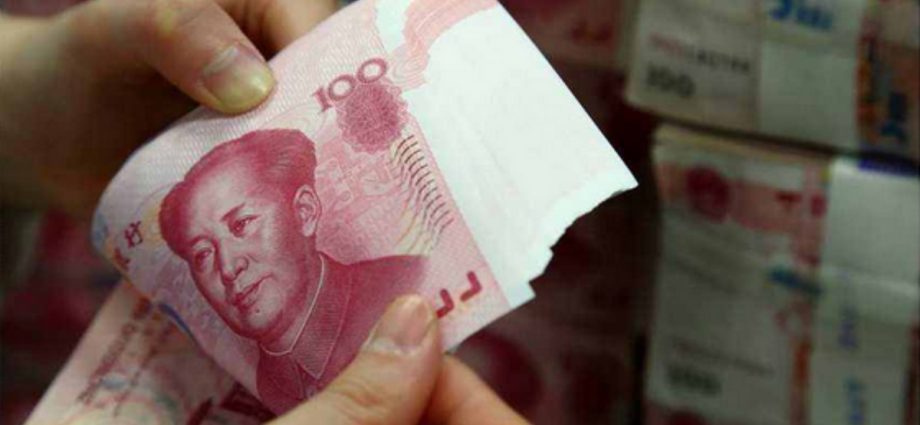
The People’s Bank of China (PBoC) has allowed a 2% drop of the Chinese currency so far this month after China’s exports and foreign direct investment (FDI) fell year on year in May.
The country’s central bank on Monday lowered the Chinese currency’s daily midpoint by 261 basis points, leading to a further depreciation of renminbi.
On Monday, the yuan fell to 7.23 to one United States dollar, getting close to the 7.3 level recorded last October and November when China still had zero-Covid rules. Over the past three months, it has fallen by 5%.
Due to the yuan depreciation and the weaker-than-expected tourism data during last week’s three-day Dragon Boat Festival, the Shanghai Composite Index fell 1.48% to 3,150 on Monday. The Hang Seng Index, the benchmark of Hong Kong’s stock market, decreased 0.51% to 18,794.
The yuan depreciation triggered a debate on the internet in China over whether Beijing’s promotion of renminbi internationalization played a role.
Some Chinese commentators blamed Brazil, Argentina and Russia, which started accepting yuan payments for their exports to China earlier this year but kept selling the Chinese currency to obtain Western ones.
A Shandong-based writer surnamed Huang published an article with the title, “Is Russia crazily selling off renminbi? We cannot rule out this possibility.”
“In recent months, some countries have accepted renminbi payments but they have been selling off the Chinese currency for the dollar,” Huang says in the article. “Some netizens believe that this is why the yuan has dropped significantly.”
He says China has trade deficits with Brazil and Argentina, which may not have a lot of renminbi to dispose of. But he says China has a trade surplus with Russia, which has accumulated about US$10 billion in the first five months of this year and may be selling off the Chinese currency now.
However, he goes on, it’s unclear whether Russia’s disposal of the yuan is strong enough to constitute a drag on the Chinese currency’s exchange rate.
A Henan-based columnist surnamed Niu says in an article published Sunday that Russian companies do not want to keep the renminbi they received from their exports to China. Niu says they sell the renminbi for euros and dollars and use these Western currencies to purchase raw materials and equipment.
“Such practice has formed a vicious cycle and caused renminbi depreciation,” Niu says. “To tackle this, China has recently taken some measures. Some media reports said the Bank of China has already stopped Russian clients from transferring renminbi to Europe and the US.”
RBC, a Russian media organisation, reported on June 18 that the Bank of China has restricted transactions for Russian bank clients to banks located in the European Union, US, Switzerland and the United Kingdom. But some analysts say Beijing’s move only aimed to avoid secondary sanctions from the West.
Widening interest rate gap
While the comments of Huang and Niu are welcomed by many netizens, some financial commentators and economists say their speculations have gone too far.
“Some people say Russia is selling renminbi for western currencies through Chinese banks while some others even blame the currency swap agreement between Russia and China,” Zhang Bin, a Jiangxi-based financial commentator, says in a video released on Monday. “Either these people are ignorant or they want to spread fake news to attract eyeballs.”
Zhang says there is no mechanism for Russians to sell renminbi for Western currencies through Chinese banks and the currency swap agreement between Russia and China is only a financial tool for both sides to borrow each other’s currency.
He adds that renminbi depreciated for different reasons, including the United States’s rate hike and the weaker-than-expected economic recovery in China. He stresses that the yuan depreciation is within a manageable range.
A financial columnist who called himself Laonan says in an article that renminbi had grown more than 10% in dollar terms between 2020 and 2022 as the US economy declined while China’s exports continued to increase. Since that trend reversed last year, he notes, it is normal for the yuan to depreciate.
He says the widening interest rate gap, caused by the United States’s “crazy rate hikes” and China’s rate cuts, has also added pressure to renminbi. He says it’s ridiculous that Russia is blamed for “stabbing China with a knife.”
“The Japanese yen has decreased 9.57% so far this year. So, who stabbed Japan?” he asks.
Guo Lei, chief economist at GF Securities, told the media last month that renminbi will continue to fluctuate in the rest of 2023 but the chance it will have a sharp decline remains small. Guo said the renminbi’s value will depend on China’s economic performance.
China’s total exports fell 8% to US$283.5 billion in May from US$308.2 billion a year ago, according to the General Administration of Customs.
Besides, the Ministry of Commerce said on June 16 that China’s FDI fell 18.7% to US$10.85 billion in May from US$13.35 billion a year earlier. FDI decreased 5.6% year-on-year to US$84.35 billion in the first five months of this year from the same period of last year.
Read: China retail sales growth slow, job markets shaky
Follow Jeff Pao on Twitter at @jeffpao3

